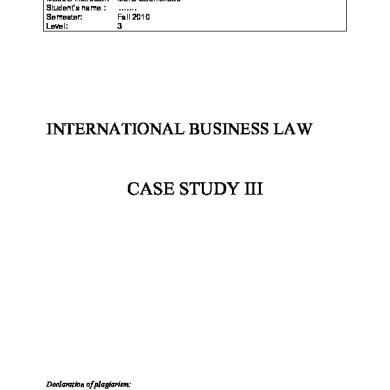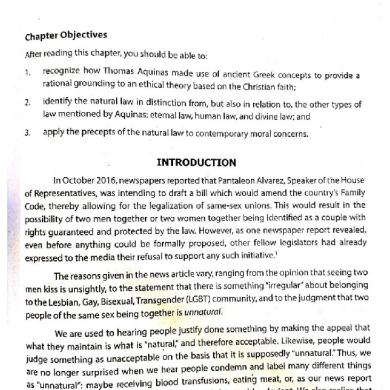* The preview only shows a few pages of manuals at random. You can get the complete content by filling out the form below.
Description
Module code: Module instructor: Student’s name : Semester: Level:
GRK 308U Maria Soumelidou ……. Fall 2010 3
INTERNATIONAL BUSINESS LAW
CASE STUDY III
Declaration of plagiarism:
I certify that this assignment is a result of my own work and that all sources have been acknowledged: Signed:
Date:
SECTION A Case study III.1 Seller, whose place of business is in State A, and Buyer, whose place of business is in state B, enter into a contract that stipulates that the CISG applies. Neither State A or State B is a contracting state. Does the CISG applies? This case study is about a Seller, whose place of business is in State A and a Buyer, whose place of business is in State B which enter into a contract that stipulates that CISG applies. In the case study is specified that neither State A, nor State B is a contracting state. CISG (Convention on Contracts for the International Sale of Goods) was adopted at a conference in Vienna in 1980 and it incorporates rules from all the major legal systems. According to August et al (2009) CISG applies to contracts for international sale of goods where the buyer and seller must have the places of their business in different states. In our case State A is different from State B. Also, either (1) both of the states have to be contracting states to the convention or (2) the rules of private international law “ lead to the application of the law of a contracting state” ( August et al 2009, p. 521). To conclude if the buyer’s and seller’s places of business are not from a contracted state CISG may still apply with the condition that they enter into a contract in a different state which is a contracting state and in our case State C is a contracting state so the CISG applies. Word count: 203 Case study III.2 Seller owned a cargo of 10, 000 barrels of oil that had been shipped on January 1 for arrival in February 1. On February 15, Seller informed Buyer that the oil was en route and they concluded a contract. On arrival, inspection showed that the oil was contaminated by sea water at some indeterminate time during the voyage. Assuming that the CISG applies, who bears the risk? This case study is about a seller who owned a cargo of 10, 000 barrels of oil which were transported to be sold to a buyer. When it arrived to the buyer after the inspection it was shown that the oil was contaminated. The legal issue that is going to be discussed in this analysis is about the passing of risk in order to see who is responsible for the loss, the buyer or the seller.
2
According to the theory the passage of risk is changing of responsibility for loss or damage from the seller to the buyer or vice versa. This means that when the risk passes, the buyer must pay the agreed price for the goods. In case if he can show that the loss or damage was because of seller’s fault is he excused from paying the price. CISG gives the opportunity to parties to allocate the risk among themselves and to state when the risk will pass between them. This can be done through the use of trade terms, like Free on Board (FOB) or Cost, Insurance, and Freight (CIF). The FOB contract requires a seller to transport goods on board a vessel that is to be chosen by the buyer. A FOB contract stipulates that a seller is responsible for getting goods on board a ship chosen by a buyer. A seller’s responsibility does not end at the point the goods arrived at the destination unless the goods are also “ appropriated to the contract” (August et al 2009, p. 576). A CIF contract requires the seller to make arrangements for the transportation of goods by sea to a port of destination and to give to the buyer the documents necessary to get the goods from the carrier or to make a claim against the insurer if the goods are damaged or lost. The seller’s responsibility is over when the documents arrive in buyer’s hands. Then the buyer has to pay the agreed price. Since in our case was no agreement on a FOB or CIF contract these will not apply. There are cases when the goods are sold after they are already on board a carrier. In these cases, the risk of loss belongs to the buyer at the time the contract is made. However, in case that at the time the contract was concluded, the seller knew that the goods had been damaged or lost and he did not say this to the buyer, the risk passes to the seller. In our case is not specified that the seller knew or ought to have known that the goods were damaged. To conclude in this case the risk belongs to the buyer because the goods were sold when they were still on board at the time the contract was made. Word count: 460 Case study III.3 Seller contracted to deliver 1,000 barrels of oil to Buyer for 14 000 euros. When the oil arrived, 975 barrels complied fully with the contract description. Twenty- five were contaminated and unacceptable. Oil in comparable barrels was available in the local market for 18 euros per barrel in 25- barrel lots. Seller offered not to charge Buyer for the barrels. Assuming a valid contract under CISG, what payment is due to the seller? And, what remedies, if any, are available to the Buyer?
3
In this case study is about a Seller who contracted to deliver 1,000 barrels of oil to a Buyer at a specific price. When the oil arrived it was found that a part from the barrels was contaminated. If the Seller delivered 1,000 barrels at the price of 14, 000 euros, then one barrel costs 14 euros. For the 975 acceptable barrels the Buyer owes 13 650 euros (975*14= 13650). For the 25 contaminated barrels the Buyer does not owe anything. But still he needs the twentyfive barrels for his business so he has to buy it from the market at a price of 18 euros per barrel. Like this he has to pay 100 euros more from his pocket, but since the barrels were contaminated maybe from Seller fault he can ask 100 euros damages from the Seller. Since the contract was signed under CISG law, the rule on damages stated in Article 74 from the convention says that: “Damages for breach of contract by one party consists of a sum equal to the loss…” (August et al 2009, p. 565). To calculate the damages we measure the difference between the contract price and the price received in the substitute transaction. To conclude the sum that the Buyer has to pay to the Seller is 13 550 euros (13 650-100 (for the damages) = 13 550). The remedies available to the Buyer are to require a specific performance, to avoid the contract for breach or nondelivery, to reduce the price, to say no to early delivery, and to say no to excess quantities. Word count: 258
SECTION B Q1: Different cultural, social and economic backgrounds require different approaches in interpreting foreign trade contracts. Assuming in the previous case study III.3 : a) that the seller is from U.K and the buyer is from a former soviet union republic, and b) that the contract of sale was not concluded in writing (disregarding the value of goods), How did the CISG compromise the different social and legal backgrounds and their needs? In modern countries such U.K and U.S which require more flexibility and speed and less bureaucracy does not especially require a written contract, however in the U.K Sale of Goods Act of 1893 is required a signed writing contract. In countries like socialist, communist and soviet countries which look for stability, safety and more bureaucracy for the contracts they require a contract to be in written (August et al 2009).
4
How CISG compromise the different social and legal backgrounds is shown in Article 11 and Article 96 from the convention. Article 11 says that: “A contract of sale need not to be concluded in or evidenced by writing and is not subject to any other requirement as to form. It may be proved by any means, including witnesses” (August et al 2009, p. 537). Article 96 says that if a contracting state “whose legislation requires contracts of sale to be concluded in or evidence by writing” (August et al 2009, p. 538) is authorized to complete a declaration at the time of ratification that Art. 11 does not apply where one of the parties has his place of business in that state. Word count: 176
Q2: Why does Brussels push for massive uptake of e-invoicing? Discuss the problems facing SME’s in regard to these requirements. Brussels pushes for massive uptake of e-invoicing mainly because of environmental issues. E-invoicing will have positive environmental effects by lowering CO2 emissions because of mail transportation, lowering paper consumption, eliminating of the costs with postage and having a better computerization of bureaucratic practices (Brussels pushes for massive uptake of e-invoicing 2010). The problems that SMEs have in regard to these requirements are financial and legal. The cost of purchasing the software or hardware can be high for a SME and unaffordable. There are also legal obstacles which result from different e- invoicing rules from one country to another, like for example advanced electronic signatures (Brussels pushes for massive uptake of e-invoicing 2010). Word count: 97 Total word count: 1194
5
Bibliography: August,R., Mayer, D.&Bixby, M. 2009, International Business Law: Text, Cases and Readings, 5th edn, Pearson Education, Inc., Upper Sandlle River,New Jersey, USA. Brussels
pushes
for
massive
uptake
of
e-invoicing
2010,
EurActiv,
.
6













